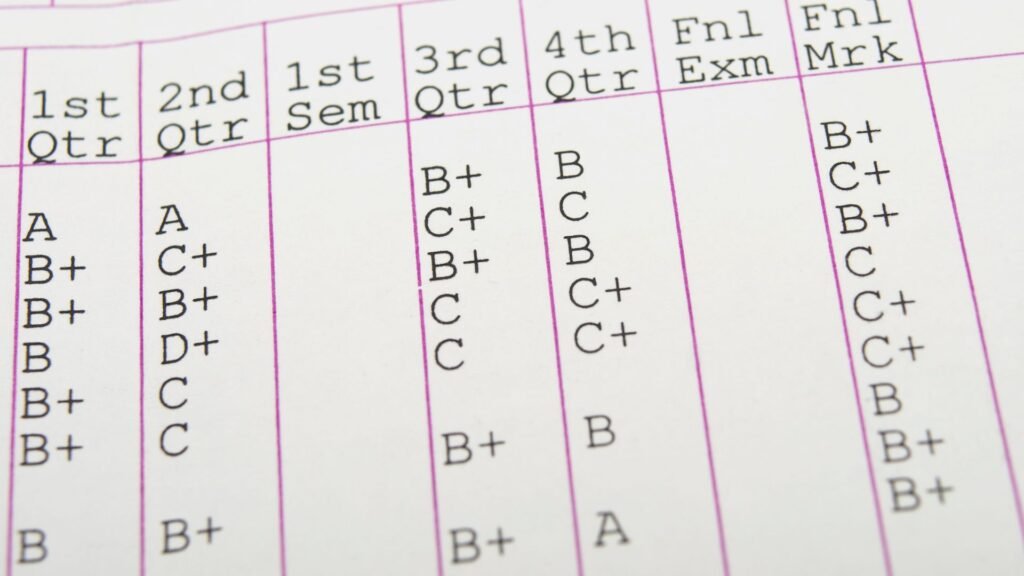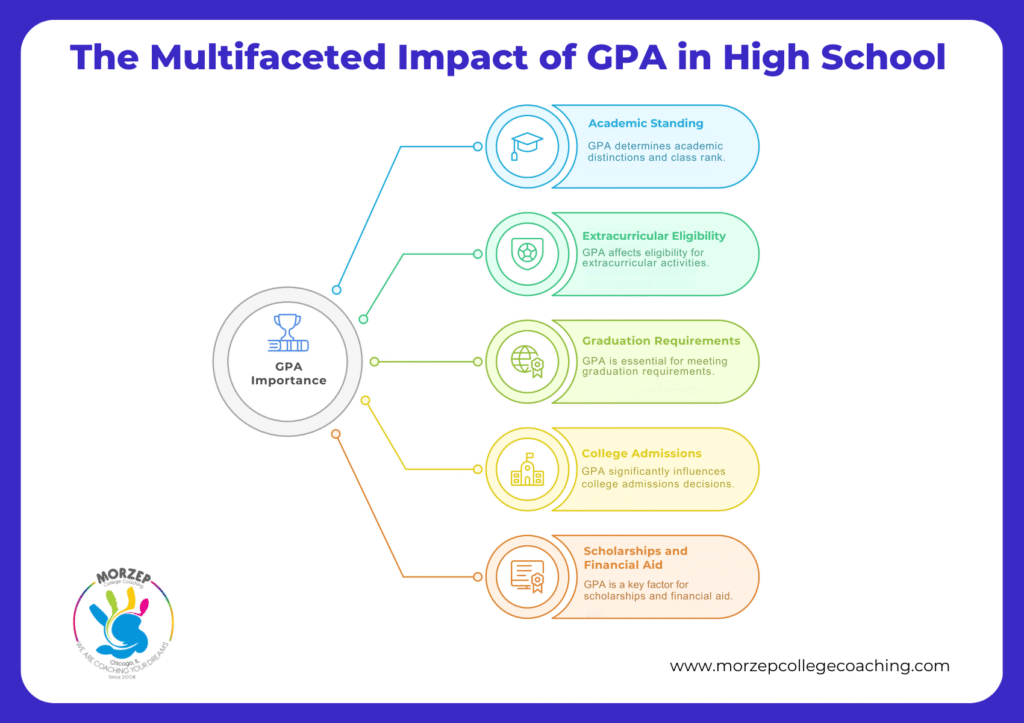Dreaming about getting into an Ivy League school? High school GPA is crucial to achieving your goal, which is why many students become excessively stressed about it.
As graduation approaches, a common concern among students and parents is, “Does high school GPA matter after high school?” It’s a valid question, especially given the importance placed on grades throughout high school.
In this blog post, we’ll cover:
- Understanding high school GPA and why a student’s GPA is important
- College admission and high school grades: what’s the connection
- How grades in high school affect your ability to get a scholarship
- Overall GPA and life after college: Does it impact career opportunities?

What Is GPA and How Is It Calculated?
Your GPA, or Grade Point Average, is a numerical representation of your academic performance in high school. It is calculated by averaging the grades you earn in your classes, usually on a scale from 0 to 4.0. Here’s how it typically works:
- Letter Grades to Numbers: Each letter grade corresponds to a number. For example, an A is usually a 4.0, a B is a 3.0, a C is a 2.0, a D is a 1.0, and an F is a 0.
- Credit Hours: The GPA calculation takes into account the credit hours of each class.
- Unweighted vs. Weighted GPA: In some schools, advanced courses like AP (Advanced Placement) or honors classes carry extra weight.
Why Is GPA Important in High School
In high school, your GPA plays a crucial role in several aspects of your academic and extracurricular life:

- Academic Standing: GPA helps to classify students into categories like honor roll, dean’s list, or other academic distinctions. High school GPAs can also impact class rank, which compares your performance to that of your peers. A lower GPA could indicate you’re not doing as well as you’re hoping for.
- Extracurricular Eligibility: Many schools have minimum GPA requirements for participation in sports, clubs, and other extracurricular activities.
- Graduation Requirements: To graduate from high school, students must meet certain academic standards, which often include maintaining a minimum GPA.
- College Admissions: Your GPA is a significant factor in college admissions. Colleges use it to assess your academic readiness for college-level work.
- Scholarships and Financial Aid: Many scholarships and financial aid programs require a minimum GPA for eligibility. For instance, the National Merit Scholarship Program and various state-sponsored scholarships consider GPA as a primary criterion.
Understanding the importance of GPA and how it is calculated can help you make informed decisions about your academic journey. It’s not just a number; colleges look at it as an overall representation of your ability, academic integrity, and commitment to excellence.
Speak with a college coach today!
Speak with an expert college coach and learn if working with one is right for your academic journey. Free 15-minute consultation, no cost, no obligations.
Does High School GPA Matter in College?
Several studies highlight the significance of GPA in college admissions and its correlation with future academic success. For example, a study by the National Association for College Admission Counseling (NACAC) found that 73.2% of colleges rated grades in college prep courses as the most important factor in admissions decisions.
GPA and Scholarships
Securing a college scholarship can be a game-changer, making higher education more affordable and accessible. One of the key factors in earning these scholarships is your high school GPA as evidence of academic rigor. But how exactly does your GPA transcript play into the scholarship game?
Do colleges look at high school GPA?
Yes, colleges look at your high school GPA; it’s a key part of admissions. A good GPA shows your work ethic and performance throughout your high school career.
Merit-Based Scholarships: How High School GPA Can Impact Eligibility for Scholarships
High school GPA plays a significant role in securing merit-based scholarships, which are financial awards given to students based on their academic achievements.
- Eligibility Criteria: Many scholarship programs set a minimum GPA requirement that students must meet to be eligible.
- Competitive Edge: A high GPA not only qualifies you for more scholarships but also makes you a more competitive applicant.
- Additional Factors: While GPA is crucial, many scholarships also consider other factors such as standardized test scores, extracurricular activities, community service, and leadership roles.
Types of Scholarships: Different Scholarships That Consider GPA and Other Criteria
There are various types of scholarships available to students, each with its own set of criteria:
- Academic Scholarships: These are awarded to students who have achieved high academic standards, often with a minimum GPA requirement. Examples include the National Merit Scholarship and many university-specific academic scholarships.
- Leadership Scholarships: These scholarships are awarded to students who have demonstrated strong leadership skills, often in conjunction with a high average GPA. Programs like the Coca-Cola Scholars Program recognize students who excel academically and show leadership potential.
- Extracurricular and Community Service Scholarships: Scholarships like the Prudential Spirit of Community Awards honor students who have made significant contributions to their communities through volunteer work, along with maintaining good grades.
- Field-Specific Scholarships: Many scholarships are offered to students pursuing specific fields of study, such as STEM (Science, Technology, Engineering, and Math), the arts, or business. These often have GPA requirements and may consider academic performance in relevant subjects.
Is a 2.0 GPA horrible?
A 2.0 GPA is considered below average and may limit your college options, but it doesn’t mean you can’t get accepted anywhere.
Does High School GPA Matter After High School: College Admission Essentials
Your high school GPA doesn’t just influence how the admission office sees your application. It can also significantly impact your experience once you’re there. From academic placement to internships and even graduation rates, your GPA plays a role in shaping your journey after college acceptance. So, how does high school GPA matter after high school?
Academic Placement
One of the first ways your high school GPA affects your college life is through academic placement. Colleges use your GPA to determine your eligibility for honors programs and advanced courses:
- Honors Programs: Many colleges have honors programs that provide enriched academic experiences. These programs may include special seminars, priority registration for classes, and dedicated advising. To qualify, students typically need a high GPA, often above 3.5.
- Advanced Courses: Your GPA can also influence whether you’re placed in advanced courses right from the start. For example, students with high GPAs might be eligible to skip introductory courses and move directly into higher-level classes.
Is a 2.5 GPA bad for a senior?
A 2.5 GPA is slightly below average for high school seniors, which can make admission to more selective colleges challenging.
Opportunities and Internships
Maintaining a strong GPA can also open doors to valuable opportunities such as internships, co-op programs, and study abroad experiences:
- Internships and Co-op Programs: Many companies and organizations set minimum GPA requirements for internship applicants.
- Study Abroad Programs: GPA requirements ensure that participants are academically prepared for the challenges of studying in a new environment.
Does High School GPA Matter After College: GPA in the Job Market
As you transition from college to the professional world, you might wonder how much your GPA will matter in securing your first job.

Early Career Impact: How Recent Graduates’ GPA Can Affect Their Job Prospects
How does high school GPA matter fresh out of college? Your GPA can play a notable role in your job search:
- Entry-Level Positions: Many entry-level positions, especially in competitive fields like finance, consulting, and engineering, consider GPA as part of their hiring criteria.
- Internship and Co-op Programs: Just as with college, internships and co-op programs for new graduates may require a minimum GPA.
- Graduate School Applications: Graduate programs, particularly at selective colleges and universities, use GPA as a significant factor in admissions.
- Scholarship Opportunities: Many post-graduate scholarships and fellowships require a high GPA.
Long-Term Career: The Diminishing Importance of GPA as Professional Experience Grows
While a high GPA can open doors early in your career, its importance diminishes as you gain professional experience and build a track record of job performance.
- Professional Experience: As you accumulate years of work experience, employers place more weight on your professional accomplishments than your academic performance.
- Skill Development: Continuous learning and professional development can overshadow your GPA.
- Networking and Relationships: Building a professional network can also reduce the emphasis on GPA.
Does high school GPA matter for college transfers?
Yes, for transfer students with few college credits, your high school GPA may still matter. Colleges may check your high school transcript, GPA scale, and rigorous courses.
Morzep College Coaching: Your Partner in College Success
At Morzep College Coaching, we understand that navigating the college admissions process can be daunting. And we also understant that you want to learn the answer to the question: Does high school GPA matter? With so many factors to consider—school grades, test scores, essays, extracurricular activities—it’s easy to feel overwhelmed.
That’s where we come in. Morzep College Coaching is dedicated to guiding high school students and their families through every step of the college application process, ensuring that each student can achieve their academic and personal goals.
Contact us today for a consultation and discover how we can help you achieve your dreams. Together, we’ll make your college aspirations a reality.





